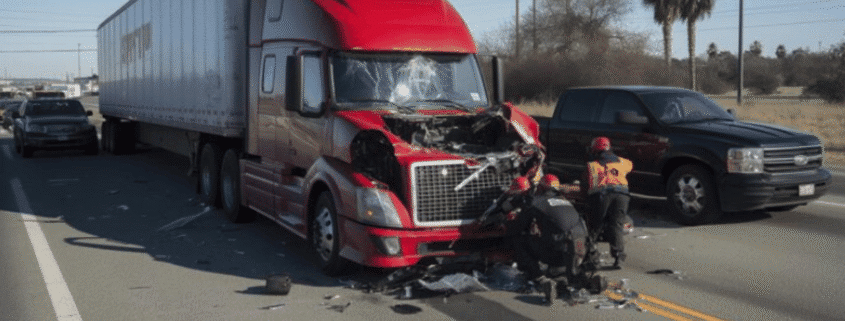What to Do After a Semi-Truck Accident?
Everything changes after a semi-truck hits you fast. Your head is full of worry, phone calls, and pain. This guide walks you through the clear, useful steps that matter most right after the crash. Start with safety and medical care. Then gather proof and keep records. We are going to explain Utah rules you need to know and why truck claims can be different from car crashes.
Read this now and save it to your phone. If you ever need it, these are the exact actions that protect your health and your legal options.
Key Points You Should Know
- Move out of traffic if it is safe to do so
- Take wide and close photos from multiple angles
- Write down driver, company, and witness info
- Keep every medical, repair, and travel receipt
- Do not apologize or admit fault at the scene
- Back up photos and dashcam clips immediately
- Talk to a truck lawyer before long recorded statements
At the scene, small moves that make a big difference
When the truck hits, things get loud and fast. First rule: stop and check for injuries. Ask for help if you need it. Don’t hesitate to contact the police. Moving your car to a safe place is recommended. Keep your vehicle if you cannot move until help arrives.
Next, take photos. Lots of them. Start with a wide shot that shows where every vehicle ended up. Then take close shots of damage, plates, the truck’s trailer number, road signs, and anything spilled on the road. Record short videos if you can. The raw phone footage you shoot is often more honest than later memories.
Medical care: treat records like evidence
Doctors and records are the proof you will need. A medical visit links the crash to your pain. That link is important for a claim. Be honest with the doctor. If a test shows a problem, make sure the report is saved in your folder.
Write a short daily note about how you feel. Jot down sleep problems, trouble with chores, or limits at work. That diary helps show how the crash changed your day-to-day life. Keep dates for every appointment and missed work days.
Follow treatment plans. If therapy or follow-up tests are advised, do them. Skipping care can look like you are not hurt or not serious. Use the same clinic when possible, so records are consistent. If a new symptom appears, go back and get it checked. These records are for your health and for anyone who helps you with your claim.
Save real evidence now: what matters most?
Collecting evidence does not have to be a full investigation. Do a few clear things well. Take multiple photos and back them up to the cloud right away. Save dashcam clips to a second device. Write down the time and the weather. Small details can connect the dots later.
For truck crashes, the following items matter a lot: the truck’s plate, trailer or USDOT number, driver identity, and any company name on the vehicle. Many trucks use electronic logging devices that record driving hours. Those ELDs and driver logs can show whether a driver was fatigued or disobeyed hours limits. The FMCSA requires many commercial drivers to use ELDs. That data is often key in truck claims.
Report the crash and note what matters in Utah
Don’t wait to report the crash. That report helps show what the officer saw and noted.
It is best to keep this first notice brief. Do not give long recorded statements or sign anything from an insurer without asking a lawyer. Insurance companies may ask for quick answers to close a file early.
Keep deadlines in mind. Many claims must be started within a few years, but some types of claims have shorter notice rules. If the other party is a government agency, different rules may apply. Because deadlines matter, a simple call to a lawyer early on can keep you from missing dates that affect your rights.
If the truck belongs to a company, report that fact to your attorney. Companies keep records. Those records can be time sensitive. A lawyer can send a request to preserve evidence so records are not lost.
Common causes of truck crashes and why they matter
In truck collisions, several factors are usually involved.
Proving the cause helps point to who is responsible. If a driver worked too many hours, the truck company may share the blame. If a broken brake or worn tire caused the crash, repair records matter. If cargo shifted and made the truck tip, the shipper or loader might be responsible.
Showing cause often needs expert help. Crash reconstruction, log analysis, and mechanical inspections can make a claim stronger. That does not mean you must do all that on your own. A lawyer experienced in truck cases can explain which records matter and arrange the right experts to review them. The stronger your proof, the better your chance to be made whole.
Hire a trusted Utah semi truck accident lawyer (what to expect)
If your case involves a large truck, you should get someone who knows how these cases work. A truck claim is different from a normal car crash. It often requires digging into driver logs, company rules, truck maintenance records, and electronic data. That means more paperwork and more players. A good local lawyer plans for that and stays in close touch.
When you call a lawyer, bring what you have: photos, the police report number, medical receipts, and witness contacts. A firm like Cockayne Law and Chris Cockayne team are used to handling motor vehicle injury cases in Utah. They listen first, then explain the steps and timing. That kind of help can stop mistakes that weaken a claim.
Final thoughts
A semi-truck crash shakes your life. The best moves are simple: get safe, get medical care, take photos, and save every bill. Don’t rush into recorded statements or quick offers. Truck wrecks can involve many records and many players.
FAQs
Can a small injury turn into a big claim?
Yes. Some injuries worsen over days or weeks. Keep medical records and follow treatment to show full impact.
Do trucks always have ELD data?
Many newer trucks use electronic logs. Those logs can show driving time, speed, and rest breaks. Lawyers request this data early.
How long does gathering truck records take?
Getting logs and maintenance files can take weeks. Lawyers often send formal requests and preservation notices to speed the process.
Can I get paid for future medical care?
Yes, if you prove the need through medical records and expert estimates. Your lawyer may work with medical specialists to estimate future care costs.
How do truck lawyers get paid?
Many handle cases on contingency. They cover upfront costs and take a fee only if you recover. Ask for a clear written fee agreement.








